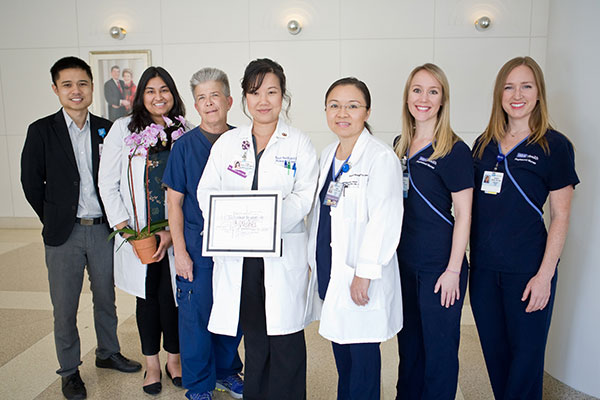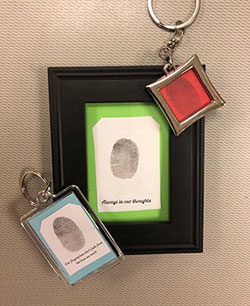Project that Began With a 2017 Seed Grant is Now Flourishing at UCLA Medical Center
Editor’s Note: Thanh Neville, MD, MSHS is a board-certified pulmonary and critical care physician and researcher working in the intensive care unit at UCLA Medical Center and is a recipient of a 2017 Seed Grant from the Gary and Mary West Foundation, awarded at last year’s CSU Shiley Institute for Palliative Care National Symposium for Academic Education and Research.
By Thanh H. Neville, MD, MSHS
“I actually sleep with that blanket every night, because that’s the last thing that Adam touched.” Sandy’s words sent chills down my spine and tears to my eyes. It was a few months after her husband’s death, and I had asked her if she remembered the blanket that I had given to her as part of our 3 Wishes Program at UCLA Medical Center. Through the program, clinicians elicit and implement final wishes for patients dying in our intensive care unit (ICU). Adam was only 36 and was a brilliant software entrepreneur who loved spending time in the Santa Monica outdoors with his wife. Sandy knew he would not have wanted to spend his final moments within the four walls of his hospital room.
As part of 3 Wishes, we (doctors, nurses, and respiratory therapists) moved his bed to the outdoor 4th floor terrace, disconnected him from mechanical life support, and allowed him to die peacefully outside as the sun set, with his wife snuggled next to him. Adam was the first patient in our program, and even now, months later, the image of Sandy and Adam on that terrace remains imprinted in my mind.
Unfortunately, Adam and Sandy’s story is only one of many heartbreaking stories in the UCLA Medical Center ICU, where the mortality is approximately 20%. As an ICU physician, I have come to accept that guiding patients and families through the end-of-life process is an inevitable and crucial part of my profession. However, unlike most of the ICU deaths I experienced prior to the existence of 3 Wishes, deaths under the new program have sustained and encouraged me.

Going ‘Above and Beyond’
For the first time, doctors and nurses are now able to actively provide acts of kindness during the dying process. Many have fully embraced the initiative and have gone “above and beyond.” I have watched exhausted nurses happily working beyond their 12-hour shift to decorate the room of a dying patient, to provide a final “date night,” or to make a clay casting of a husband and wife holding hands for the last time. I have seen my “3 Wishes” inventory replenished with items that I did not purchase, and learned later that the items had been donated.
The kindness I’ve witnessed is not limited to the providers—I have fulfilled wishes for patients who wanted to make sure that their organs would be donated to save other peoples’ lives, and families who wanted trees to be planted or money donated to charity/research in their loved one’s honor. Families have come back to make donations to help sustain the program and thereby “pay it forward.” I have learned that, sometimes, in what seems like infinite darkness, the human spirit shines with compassion, kindness, and grace.
I have been grateful to realize that our program is the epitome of how “Small things make big differences.” As the lead researcher on 3 Wishes at UCLA, I have conducted many interviews where families have told me about lasting impressions and gratitude for items and actions that may appear trivial and inconsequential.

A wife told me how she can still hear her husband’s favorite music that was playing in the room on his final day; a daughter told me how much she appreciated that the nurses gave her mother a final “spa day” before she died, multiple family members have shown me that they always carry with them the thumbprint keepsakes we provided; and others have told me that the word clouds our program crafted to describe their loved ones are now permanent displays in their homes. And blankets that kept our patients warm in their final moments now provide the living with a sense of intimacy and solace.
From Seed Grant to Sustainable
Our program started as a pilot with a small seed grant from the CSU Shiley Institute for Palliative Care funded by the Gary and Mary West Foundation. The original project was created by Dr. Deborah Cook in St. Joseph’s Hospital in Hamilton, Canada. UCLA Medical Center is the first American hospital to offer the service.
As the Director and Co-Founder of 3 Wishes at UCLA, I quickly realized I needed to make this program sustainable long-term and was determined to stretch every dollar to benefit as many patients as possible. I stayed up late on the night before Black Friday to snatch the best deals for items that I felt our patients could benefit from. Our nursing unit director and I spent weekends shopping at discount and wholesale stores to purchase warm, quality blankets and frames for word clouds. I scrounged the internet and learned that I can save 75 cents for every metal keychain (that we use for thumbprint keepsakes) if I purchased them in bulk directly from China.
I have spent hours and hours organizing our database, motivating members of the ICU team to not forget about this service that we now offer, replenishing our inventory with a small budget, and rigorously evaluating the impact of the program on clinicians and families. I have applied for other grants and given presentations in order to share the value of our program to potential donors. Fortunately, it only takes one family interview to remind myself that all my efforts are well worth it.
As I look back at my journey as a clinician and as a researcher, I realize that I have come a long way from where I started. As a researcher whose interest is in improving end-of-life care in the ICU, I have been called names such as a “death panelist” and “Kevorkian.” For the first time, my work is now associated with a positive, hopeful tone, even when the focus is about improving the experience of death and dying. I could have never imagined that a small initiative such as 3 Wishes could make such a big impact on so many people, including myself, but it genuinely has, and for that, I am truly grateful.




